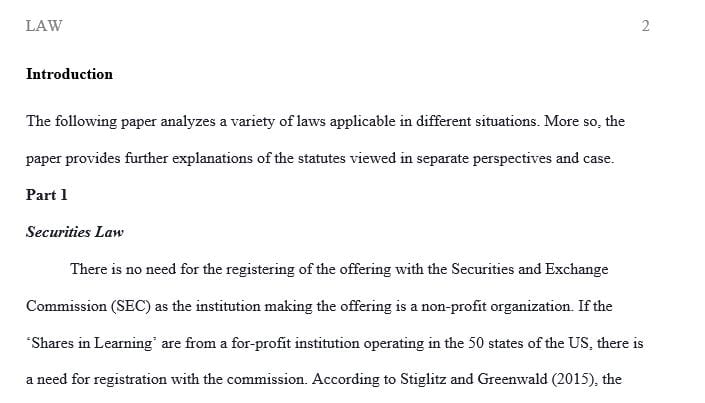Will the offering need to be registered with the Securities and Exchange Commission (SEC) under the Securities Act of 1933
Discussions WEEK 4-5 Securities Law
Part 1
Securities Law (Answer in 200- 250 words)
Private University, a private nonprofit educational institution located in California, decides to issue “Shares in Learning” certificates in a one-time offering to the public. These shares will be sold for $500 each and entitle the bearer to redeem each certificate for two undergraduate or one graduate college credit in any of its schools at any time in the future. The shares may also be resold without restriction by the initial purchaser. The offering will be made via the Internet.
Will the offering need to be registered with the Securities and Exchange Commission (SEC) under the Securities Act of 1933? Explain. Does your answer differ if “Shares in Learning” are issued by Private College, a proprietary for-profit institution that does business in all 50 states? Why?
Part 2
Antitrust Law (Answer in 200- 250 words)
Review the “AT&T Pulls $39 Billion T-Mobile Bid on Regulatory Opposition (Links to an external site.)” article.
In 2011, AT&T attempted a merger with T-Mobile. The Justice Department sued under the act, claiming that the merger would constitute a violation of the antitrust laws. In 2012, AT&T dropped its attempt at the acquisition.
If AT&T had merged with T-Mobile, would the merger have violated antitrust laws? Why, or why not? Do not be unduly influenced by the Justice Department’s stance on the issue. Use your own analysis to reach a conclusion.
Part 3
Employer Liability for Negligent Hiring (Answer in 200- 250 words)
Read Malorney v. B&L Motor Freight, Inc. in Section 21.2 of your textbook. Discuss what duty or duties a business has with regard to checking the background of potential employees before hiring. Do you agree that businesses should be liable for injuries resulting from negligent hiring? Why, or why not?
Part 4
Discrimination (Answer in 200- 250 words)
Not all discrimination is prohibited by law. For example, employers routinely discriminate between potential employees based upon education or experience. Other types of discrimination are more subtle, but still legal. For example, some employers discriminate between potential employees based upon personal characteristics such as weight or attractiveness. Should employers be permitted to discriminate based upon attractiveness? Take a side and argue that an employer should or should not be permitted by law to discriminate against persons who are not attractive.
Part 5
Claims to Environmental Friendliness
After reading The Seven Sins (Links to an external site.), discuss the tension between business’s interests in maximizing profits and the public’s interest in receiving complete, truthful, and non-misleading information about products that they purchase. From a business perspective, what are the dangers of greenwashing? If you were a marketing executive, would you have a policy against greenwashing? Why or why not?
Part 6
Environmental Statutes
Visit the Small Business Administration’s “Environmental Regulations (Links to an external site.)” page and visit the United States Environmental Protection Agency’s “Laws & Regulations (Links to an external site.)” page.
Identify one environmental law that is relevant to your past, current, or future employer. Apply that law to a business situation created by that employer. How does (or did) that employer maintain compliance with that statute? Do you believe that environmental regulations help or hinder business? Why, or why not?
Solution preview for the order on will the offering need to be registered with the Securities and Exchange Commission (SEC) under the Securities Act of 1933
APA
1425 words
